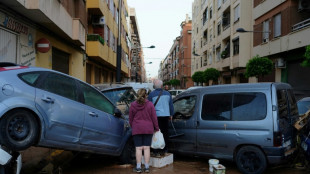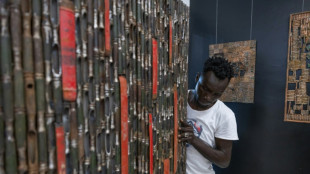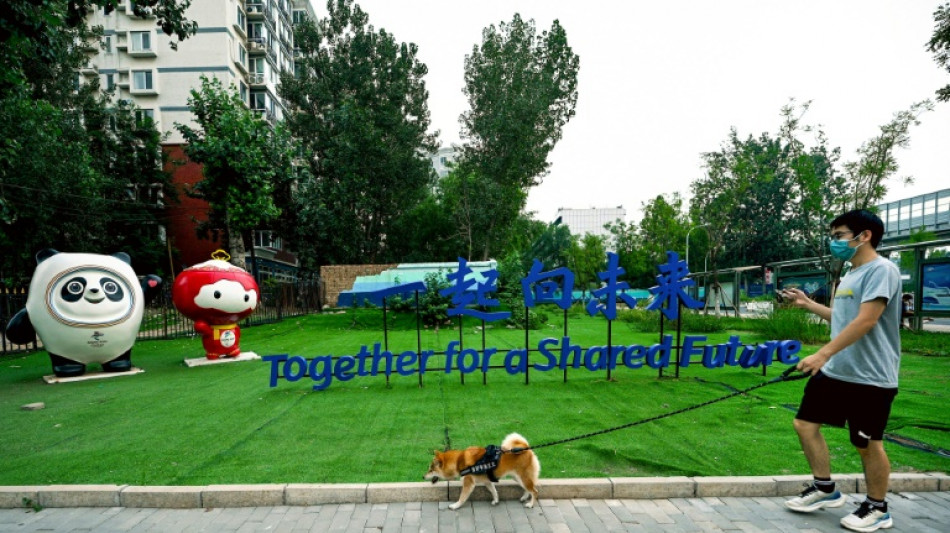
-
 Japan cyclists risk jail for using a mobile
Japan cyclists risk jail for using a mobile
-
Summit to save nature enters final day with disagreement on funding
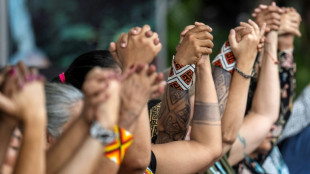
-
 Fright night: NY marks Halloween parade with political edge
Fright night: NY marks Halloween parade with political edge
-
North Korea says test-fire 'perfected' new solid-fuel ICBM

-
 England and New Zealand in search of November flourish
England and New Zealand in search of November flourish
-
Spotlight on half-backs as Springboks eye tour sweep

-
 US rapper Young Thug freed after guilty plea in street gang case
US rapper Young Thug freed after guilty plea in street gang case
-
Man Utd hope for Van Nistelrooy magic, Arsenal face Newcastle test

-
 Taiwan cleans up after Typhoon Kong-rey leaves two dead
Taiwan cleans up after Typhoon Kong-rey leaves two dead
-
Lewis run blitz leads West Indies to big victory over England

-
 Dead or alive? Scores missing after Sudan attacks
Dead or alive? Scores missing after Sudan attacks
-
Lawn sign wars: US election drains neighborhood spirit

-
 Some defiant south Lebanese stay put in face of Israeli fire
Some defiant south Lebanese stay put in face of Israeli fire
-
Deceptive 'bait-and-switch' Facebook groups snare US voters: study

-
 In US swing state Pennsylvania, inflation means 'rent or eating'
In US swing state Pennsylvania, inflation means 'rent or eating'
-
Immigrant dreams boil over in US-Mexican film 'La Cocina'

-
 In US, transgender candidates enter political lion's den
In US, transgender candidates enter political lion's den
-
Boeing again raises offer to end strike, union to vote Monday

-
 'Game of Thrones' movie in early development: reports
'Game of Thrones' movie in early development: reports
-
US rapper Young Thug pleads guilty in street gang case

-
 Apple narrowly beats estimates with boost from iPhone sales
Apple narrowly beats estimates with boost from iPhone sales
-
Bolivia's breadbasket squeezed by pro-Morales blockades

-
 Mahomes, Mayfield prepare for duel as Chiefs, Bucs clash
Mahomes, Mayfield prepare for duel as Chiefs, Bucs clash
-
Alcaraz suffers Paris Masters shock as race for Turin heats up

-
 Harris blasts 'offensive' Trump for remarks on women
Harris blasts 'offensive' Trump for remarks on women
-
Alcaraz stunned by 18th-ranked Humbert at Paris Masters

-
 UN rapporteur urges climate activist's release ahead of COP29
UN rapporteur urges climate activist's release ahead of COP29
-
O'Brien takes aim at Classic again with City of Troy

-
 US says N.Korea troops ready for Ukraine combat as missile raises tensions
US says N.Korea troops ready for Ukraine combat as missile raises tensions
-
Trump's 'protect the women' comment: not the first sexist dig

-
 Rescuers race to find those washed away by Spain's floods
Rescuers race to find those washed away by Spain's floods
-
Norris expects 'cleaner battle' with Verstappen in Brazil

-
 Ballon d'Or wins 'normal' for Barcelona star Bonmati
Ballon d'Or wins 'normal' for Barcelona star Bonmati
-
Spain flooding 'catastrophe' should serve as a warning, EU says at nature summit
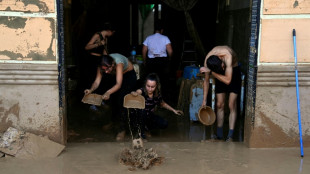
-
 Verstappen blasts 'biased' critics as world title tension builds
Verstappen blasts 'biased' critics as world title tension builds
-
Mpox is not under control, warns Africa CDC
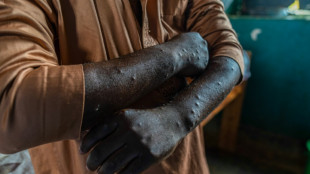
-
 Spain flood death toll soars to 158, 'dozens' missing
Spain flood death toll soars to 158, 'dozens' missing
-
OpenAI releases ChatGPT search engine, taking on Google

-
 Hamilton says Norris can win Formula One title in 'down to wire' chase
Hamilton says Norris can win Formula One title in 'down to wire' chase
-
Tsitsipas like a 'bull' to keep ATP Finals hopes alive

-
 England captain George rejects Marler call for New Zealand to axe haka
England captain George rejects Marler call for New Zealand to axe haka
-
More than 400 people come forward over Al-Fayed sexual abuse claims

-
 Strikes near south, east Lebanon cities after Israel evacuation calls
Strikes near south, east Lebanon cities after Israel evacuation calls
-
Van Nistelrooy 'motivated' to help managerless Man Utd

-
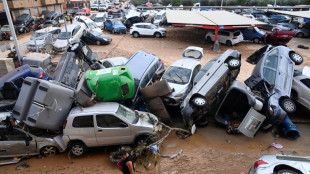 Mud and misery grip epicentre of Spain floods
Mud and misery grip epicentre of Spain floods
-
Georgia says ruling party won disputed election, opposition calls protests

-
 Harris slams 'offensive' Trump as rivals go west
Harris slams 'offensive' Trump as rivals go west
-
US election, tech jitters rattle global stocks

-
 Harris slams 'offensive' Trump as rivals hit western battlegrounds
Harris slams 'offensive' Trump as rivals hit western battlegrounds
-
Tsitsipas keeps ATP Finals hopes alive with gritty Paris win

| RBGPF | 100% | 59.6 | $ | |
| CMSC | -0.16% | 24.55 | $ | |
| RYCEF | 1.15% | 6.94 | $ | |
| NGG | -2.33% | 63.59 | $ | |
| RELX | -1.49% | 46.22 | $ | |
| VOD | -1.29% | 9.27 | $ | |
| AZN | -2.36% | 71.15 | $ | |
| GSK | -0.68% | 36.76 | $ | |
| BTI | 1.77% | 34.98 | $ | |
| RIO | -1.56% | 64.89 | $ | |
| BP | 1.16% | 29.36 | $ | |
| CMSD | -0.69% | 24.66 | $ | |
| SCS | -1.66% | 12.03 | $ | |
| BCC | -1.01% | 133.03 | $ | |
| BCE | 0.06% | 32.26 | $ | |
| JRI | 0.23% | 13.08 | $ |

Xi's 'Chinese Dream' flickers in one Beijing neighbourhood
Wu has staked out his patch of the Chinese Dream. Married with a second child on the way, he has a Beijing apartment and a car paid for by a tech job with a comfortable salary.
He has even jumped the fence of China's restrictive residency rules to move from eastern Shandong province to the capital, near the middle-class neighbourhood of Shangdi.
"Things are going pretty well," the fresh-faced thirty-something says with a smile.
His ascent through the hurly-burly of China's competitive capital has broadly tracked the leadership of President Xi Jinping.
It is 10 years since Xi unveiled the "Chinese Dream", a grand vision to restore the country's global influence through a collective struggle for prosperity, power and glory -- steered by the Communist Party.
Its achievements include pulling tens of millions from poverty into an economy fizzing on tech, manufacturing supply chains and the breathless energy of 1.4 billion people.
That has brought new freedoms and opportunities, alongside unexpected challenges for a party primed for control and self-preservation.
"Everyone has their own ideals, aspirations and dreams," Xi said in a speech on November 29, 2012 shortly after he was made party general secretary.
"In my opinion, realising the great rejuvenation of the Chinese nation is the greatest Chinese Dream."
But as Xi prepares for the party to anoint him for an unprecedented third term in office, some say that dream is losing definition.
Even in Shangdi, anxiety lurks behind the baubles of affluence.
Workers struggle with burnout and the soaring costs of housing and childcare, as well as the social pressures of marriage -- all in an economy weighed down by the Covid-19 pandemic.
Expectations for the future are changing, with potentially profound implications for China's direction.
"People are chasing different things from what they used to," says 29-year-old Anna Chen, who works for another tech firm in Shangdi.
- Tech tales -
Over the last decade, hulking office blocks have transformed Shangdi from an unremarkable suburb to a landmark on China's tech map.
The area is near the ruins of the Old Summer Palace -- destroyed by British soldiers in 1860 -- a reminder of China's "century of humiliation" at the hands of Western nations that still rankles in Beijing.
Many of Shangdi's new residents work for tech giants such as Baidu, Kuaishou and Didi Chuxing -- companies that dominate daily life in the world's most populous nation and now outsize many of their Western rivals.
With his wire-framed glasses, dark T-shirt and sweatpants, 31-year-old Sheldon Zhang wears the uniform of a generation of young tech professionals who have emerged as some of the best-educated and most cosmopolitan in China's history.
A fast-talking college dropout who co-founded a startup in his early 20s, Zhang is now a user experience architect at a major firm, tinkering with robotics and artificial intelligence in a mission he says is for the "future benefit of humanity".
Hubs such as Shangdi are drivers of AI, quantum computing, sensors and chips earmarked in the party's last five-year plan as essential for the next phase of China's development.
But industry insiders warn a "winter" has settled across the tech sector.
In a widespread crackdown, Beijing has been bringing to heel major firms over fears they have too great a hold over Chinese consumers.
Revenue growth is in decline at big-hitters such as Alibaba and Tencent, and job layoffs in the sector are rising.
China's economy grew just 0.4 percent in the second quarter of this year -- its worst performance since the start of the pandemic.
"Without an explosion of new technologies, we may start to slow down or regress," Zhang says.
- Reality bites -
Others are already feeling the squeeze.
Li Mengzhen, a 27-year-old strategy specialist at a short-video platform, says the tech scene's rank and file now self-effacingly label themselves "digital blue-collars".
"Our situation is quite similar to migrant workers in the 1990s," she says.
She has a decent salary but fears property ownership in Shangdi, where apartments easily sell for 100,000 yuan ($13,900) per square metre, will forever be beyond her.
"We left our hometowns to work in Beijing... but can't say that we're Beijingers," says Li.
"Our coders are like the people who worked on sewing machines or putting in screws... their jobs are easily replaceable."
It is an ennui spreading across much of her generation, with many seeking shared solace in a counterculture of "lying flat" -- abandoning the endless work cycle to meet the impossible goals of urban living.
China's zero-Covid strategy has chopped back at growth, making it even harder to get a job and then keep it.
Youth unemployment in urban areas has repeatedly hit record highs this year, peaking in July when nearly 20 percent of people aged 16-24 were jobless, according to the National Bureau of Statistics.
But new city cultures also provide ladders out.
At a cafe in southern Shangdi, a beaming Feng Jing says she has just quit her job at a video platform to become a yoga teacher.
"I'm someone who chases freedom," the 29-year-old says.
"I don't feel tied down by money or other preconceived ideas."
- Family values -
At the district's Love Park, giggling children chase each other while being watched over by stone statues inscribed with Communist shibboleths of China's past.
"Stabilise low birth levels, raise the quality of the newborn population," reads one monument to a family planning policy imposed in the late 1970s to slow population growth, which restricted many families to having one child.
The government is now encouraging couples to have up to three children to head off a demographic crisis poised to burden a declining, weary young workforce with the costs of paying for hundreds of millions of retirees.
It is perhaps the biggest challenge of all to the Chinese Dream, threatening to warp state spending to provide healthcare and pensions for about 400 million people over 60 years old by 2040.
If current trends continue, the population will likely peak by the end of the decade before entering a "sustained" decline, according to the state-linked Chinese Academy of Social Sciences.
Such a decline would inflict "extremely unfavourable social and economic consequences" on the country, the academy adds.
Moves to stir a baby boom, with tax breaks and childcare rebates, have so far fallen flat.
"One kid is expensive enough," said one father, declining to be identified.
Others question the need to marry or have children at all -- a radical position in a patriarchal society where the pressure to start a family is high.
Tech worker Anna Chen said she aims to earn just enough to travel the world and support her parents through their dotage.
"There are quite enough people in the world already," she told AFP, using a pseudonym to avoid blowback from her employer.
"And the way society is developing, you can live well without marriage or kids."
- Rejuvenated nation? -
In the shadow of a block of luxury apartments in Beijing, 70-year-old Wang Yufu dozes through the midday heat.
Wang moved to the city from eastern Jiangsu province around the same time Xi unfurled his Chinese Dream.
Spry and unassuming, he leads a team of migrant workers beautifying Shangdi's green spaces, earning around 6,500 yuan ($917) per month -- several times his wages when he first arrived.
China's rapid urbanisation in the last four decades has depended on migrant labour.
According to official data, there are currently 290 million people from the countryside working in urban areas, many staffing low-paid jobs.
But strict residency requirements and ballooning living costs prevent most from settling in the cities they have helped to construct.
The lunch break over, Wang cajoled his team back to work in a nearby park.
Things are better than they were a decade ago, he said, but big dreams are still for other people.
"People like us could never afford houses here."
M.Ouellet--BTB

